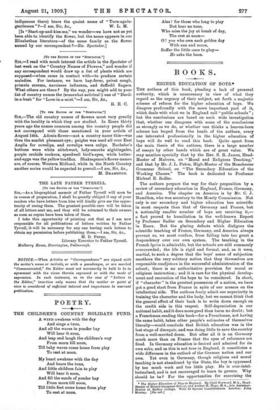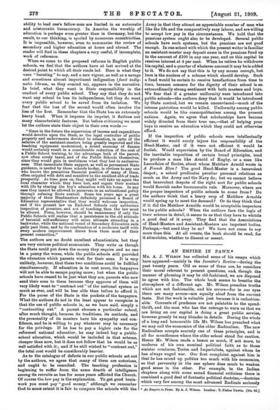BOOKS.
HIGHER EDUCATION OF BOYS.*
THE authors of this book, pleading a lack of personal authority, which is unnecessary in view of what they
regard as the urgency of their subject, set forth a majestic scheme of reform for the higher education of boys. We disagree profoundly with the more important part of it, which deals with what we in England call "public schools " ; but the conclusions are based on such wide investigation that, whether one disagrees with some of the conclusions as strongly as we do, or whether one thinks a heaven-born
scheme has leaped from the heads of the authors, every. one interested professionally in the higher education of
boys will do well to read this book. Quite apart from the main thesis of the authors, there is a large number of essays by other hands which are of great value. We may mention specially that by the Rev. S. R. James, Head- Master of Malvern, on "Moral and Religious Teaching," and that by Mr. J. L. Paton, High-Master of the Manchester Grammar School, on "The Secondary Education of the Working Classes." The book is dedicated to Professor Michael E. Sadler.
The authors prepare the way for their proposition by a review of secondary education in England, France, Germany,.
and America. The chapter on America is by Mr. C. J. Hamilton, who was secretary to the Mosely Commission. Not only is our secondary and higher education less scientific in most respects than that of Germany and France, but a noticeably smaller number of boys are receiving it,— a fact proved to humiliation in the well-known Report by Professor Sadler on Secondary and Higher Education in Essex. But the glaring defects which disfigure the scientific teaching of France, Germany, and America always prevent us, we must confess, from falling into too great a despondency over our own system. The teaching in the French lycees is admirable, but the schools are still commonly overcrowded ; the life is rigid and formal, and, as it were, martial, to such a degree that the boys' sense of subjection smothers the very salutary notion that they themselves are responsible coadjutors in the successful administration of the school; there is no authoritative provision for moral or religious instruction ; and it is rare for the physical develop- ment and recreation of the boys to be considered. In short,.
if " character " is the greatest possession of a nation, we have got a good start from France in spite of our arrears on the intellectual side. The authors freely admit our superiority in.
training the character and the body, but we cannot think that the general effect of their book is to write down enough on the credit side in this respect. Self-depreciation is our national habit, and it does more good than harm no doubt; but a Frenchman reading this book—for a Frenchman, not having the same habit, takes other people's estimates of themselves literally—would conclude that British education was in the last stage of disrepair, and was doing little to save the country from a well-merited doom. But after all it is on Germany much more than on France that the eyes of reformers are fixed. In Germany education is desired and admired for its own sake, and as this is not true in England, it constitutes a wide difference in the outlook of the German nation and our own. Yet even in Germany, though religious and moral teaching is not abandoned by the State, the boy is oppressed by too much work and too little play. He is over-intel- lectualised, and is not encouraged to learn to govern. Why should he be ? For the opportunities for exercising the.
* The Higher Education of Boys in England. By Cyril Norwood. M.A., Nead- Master of Bristol Grammar School, and Arthur H. Hope, M.A., late Assistant- Blaster at Baclley College. With 22 Special Contributions. London: John Murray. [12s. net.]
ability to lead one's fellow-men are limited in an autocratic and aristocratic bureaucracy. In America the worship of education is perhaps even greater than in Germany, but the result, to our thinking, is spoiled by numerous eccentricities. It is impossible, however, even to summarise the review of secondary and higher education at home and abroad. The reader will find in these chapters a very useful, if incomplete, work of reference.
When we come to the proposed reforms in English public schools, we feel that the authors have at last arrived at the desired point to which all their roads led. Here is what they were " bursting" to say, and a new vigour, as well as a savage and sometimes almost impertinent indignation (facit indig- natio librum, as they remind us), appears in the narrative. In brief, what they want is State responsibility in the conduct of every public school. They say that they do not want any school to lose its independence, but they do want every public school to be saved from its isolation. We fear that the loss of the second would often involve the loss of the first. Remember that the State has an extremely heavy hand. When it imposes its imprint, it flattens out many characteristic features. But before criticising we must let the authors state their object in their own words :—
"Since in the future the supervision of income and expenditure would devolve upon the State, as the legal controller of public property and endowments devoted to education, in spite of the salaries of the assistant-masters being greatly improved and the teaching equipment modernised, a sound economy of finance would certainly result in a considerable reduction of the cost of a Public School training, to the advantage both of the parent, now often sorely taxed, and of the Public Schools themselves, since they would gain in usefulness what they lost in exclusive- ness. That immediate State support, as well as permanent State guidance, is needed by these schools to-day, is obvious to any one who knows the precarious financial position of many of them, Often crippled with debt and sensitive to the smallest ebb of trade prosperity. As time goes on, they might well take up again the local character which they have lost, and regain their contact with life by sharing the boy's education with his home. In any case they cannot be allowed to persevere in an antinational policy through refusing State control. Some ten years ago a great majority of their Headmasters definitely promised a Board of Education representative that they would welcome inspection, and if the present law on Endowed Schools only authorises inspection of premises, and not of teaching, then the law must be altered. Force, however, should be unnecessary if only the Public Schools will realise that a persistence in the old attitude of baronial self-sufficiency will mean ultimate stranding in a backwater, while the national vessel of Secondary Education sails gaily past them, and by its combination of a moderate tariff with every modern improvement draws from them most of their present connection."
The authors are no doubt excellent educationists, but they are very curious political economists. They write as though the State could put down the money they require and no one be a penny the worse, while the public schools still provided the education which parents wish for their sons. It is very unlikely, however, that these two conditions could be fulfilled
simultaneously. If education is to cost more, the taxpayers will not be able to escape paying more ; but when the public
schools have ceased to be just what they are, parents who now send their sons to them because they approve of them will very likely want to "contract out" of the national system as much as ever, and will be less able than before to afford it. Por the purse of the State is the pockets of the taxpayers. What the authors do not in the least appear to recognise is that the use of public schools is, as we have said, simply a "contracting out." A parent choose's a particular school, after much thought, because its traditions, its methods, and the personality of its masters have his sympathy and con- fidence, and he is willing to pay whatever may be necessary for the privilege. If he has to pay a higher rate for the reformed national educatior, he may indeed buy a public- school education, which would be included in that scheme, cheaper than now, but it does not follow that he would be as well satisfied with it ; and if he still wished to "contract out," the total cost would be considerably heavier.
As to the catalogue of defects in our public schools set out by the authors, we agree that many of them are notorious, and ought to be remedied. The teaching profession is beginning to suffer from the same dearth of intelligence among its recruits as has for some years afflicted the Church. Of course the low pay is the explanation. To get good brain- work you must pay "good money," although we remember that to some extent it is fair to compare the schools with the
Army in that they attract an appreciable number of men who like the life and the comparatively easy labour, and are willing to accept low pay in the circumstances. We hold that the pensions system ought also to be developed. Several public schools have such systems, but the pensions are not good enough. In one school with which the present writer is familiar an assistant-master may deposit sums in the pensions fund up to the amount of £100 in any one year, and on this capital he receives interest at 4 per cent. When he retires he withdraws his capital, and a quarter of whatever amount it may be is added to it. We do not say that this is by any means enough, but here is the nucleus of a scheme which should develop. Such a fund would be certain to receive benefactions from time to time, because concern for the dignity of their school is an extraordinarily strong sentiment with both masters and boys. We fear that if a greater uniformity were introduced into public schools—the authors deny that it would be introduced by State control, but we remain unconvinced—much of the intense patriotism would be killed. Uniformity among public schools would be like cosmopolitanism among the present nations. Again, we agree that scholarships have become widely diverted from their true use,—that of helping poor boys to receive an education which they could not otherwise afford.
If the inspection of public schools were intellectually efficient it would surely injure the responsibility of the Head-Master, and if it were not efficient it would be foolish. Would supervision by the Board of Education, and the inevitable imposition of certain broad principles, tend to produce a man like Arnold of Rugby, or a man like Lacordaire of Soreze, about whom Matthew Arnold wrote in A French Eton ? The good Head-Master is a benevolent despot; a school predicates peculiar personal relations as much as the Army and the Navy do; but we cannot believe that benevolent despots of the right sort for public schools would flourish under bureaucratic rule. Moreover, where are the proper inspectors of public schools to come from? Do the authors think that a heavy crop of Matthew Arnolds would spring up to meet the demand? Or do they think that if it did the Matthew Arnolds would be acceptable inspectors to the public schools? When the authors face the logic of their scheme in detail, it seems to us that they have to whittle a good deal of it away. They find that the Associations of Head-Masters and Assistant-Masters are impotent bodies. Perhaps,—but need they be so ? We have not room to say more than this. At all events, the book should be read, for it stimulates, whether to dissent or assent.







































 Previous page
Previous page